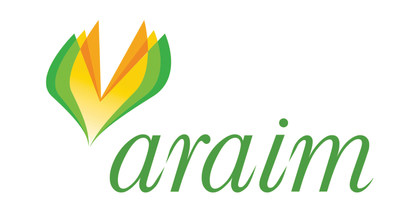TARRYTOWN, N.Y., July 25, 2016 /PRNewswire/ -- Araim Pharmaceuticals, a clinical stage drug development company with a unique platform technology for activating post-injury tissue repair and recovery, today announced that the US Food and Drug Administration (FDA) has granted Orphan Drug Designation to its lead product candidate, Innate Repair Receptor activator ARA 290, for treatment to increase survival and improve functioning of pancreatic islets following transplantation. Araim was founded by Dr. Anthony Cerami, who previously invented the hemoglobin A1c test that is used to manage diabetes worldwide.

"In an animal model, ARA 290 improved survival and function of the transplanted islets by 85%.i Increased survival of islets cells following transplantation has been the greatest challenge to successful outcomes for patients with severe type 1 diabetes. Protecting transplanted pancreatic islets from injury and subsequent loss underscores the potential beneficial role of Innate Repair Receptor Activation in conditions associated with acute or chronic stress and inflammation," said Dr. Michael Brines, Co-Founder and Chief Scientific Officer of Araim Pharmaceuticals.
"Obtaining this Orphan Drug Designation for ARA 290 is another important regulatory milestone in advancing our platform towards the patient. This fourth Orphan Drug Designation demonstrates the commitment of Araim Pharmaceuticals to prioritize and serve patients with critical unmet medical needs with our innovative Innate Repair Receptor platform" said Dr. Daiva Bajorunas, Chief Medical Officer of Araim Pharmaceuticals. "We are hopeful that improved transplant outcomes could become more widely available to the type 1 diabetic population with severe metabolic instability in need of additional treatment options."
Type 1 diabetes is an autoimmune disease in which the body attacks and destroys the insulin producing beta-cells in the pancreas. Pancreatic islet cell transplantation (PITx) is a promising experimental treatment option for patients with severe type 1 diabetes characterized by significant metabolic instability and frequent life-threatening hypoglycemic episodes. When transplants are successful, they can result in normalized glucose without the need for insulin injections. However, despite the large number of islets and multiple transplantation procedures typically required for patients, long-term graft function and insulin independence are achieved in only a small minority.
Decreased function and survival of islet infusions are the most significant barriers to successful transplantation, limiting the clinical utility of PITx. Procedure-related cytokine-induced inflammation causes early damage to islets and graft loss after transplantation. Recently published data from a large active program with ARA 290 in islet cell transplantation at the Karolinksa Institutet, Sweden demonstrate that ARA 290 significantly improves the outcome of islet cell transplantation in an animal model of type 1 diabetesi.
About Orphan Drug Designation
The Orphan Drug Designation program provides orphan status to drugs and biologics, which are defined as those intended for the safe and effective treatment, diagnosis or prevention of rare diseases or disorders that affect fewer than 200,000 people in the USii. This designation provides for a seven year marketing exclusivity period against competition, as well as certain incentives, including federal grants, tax credits and a waiver of PDUFA filing fees.
About Pancreatic Islet Cell Transplantation
According to the Collaborative Islet Transplant Registry, 602 patients have received pancreatic islet allo-transplants between 1999 and 2012 in North Americaiii. Significant obstacles to more widespread use of PITx are shortage of suitable islets from donors and process-related islet damage or destruction. The immediate inflammatory response associated with islet transplantation has been recognized as the primary cause of early damage to islets and graft lossiv,v. Multiple different regimen with immune suppressive therapies that help prevent the long-term rejection of allogenic transplanted cells are under active study. However, since a significant mass of islets is lost immediately, effective control of pre- and peri-transplant islet inflammation could improve post-transplant islet survival and in turn increase the benefits of islet cell transplantation for a greater number of patients.
About Araim Pharmaceuticals, Inc.
Araim Pharmaceuticals, Inc. is a clinical stage drug development company with a novel platform technology designed to address devastating injuries and chronic diseases underserved by current therapies. With their discovery of the Innate Repair Receptor (IRR), Araim has identified the target for activating tissue repair and recovery from inflammatory and other injuries. Their novel peptide library of IRR specific ligands activate tissue protective, reparative and anti-inflammatory signaling pathways. Araim has an ongoing, active and promising preclinical program in a wide array of conditions involving tissue injury and repair, including neuropathy, cardiovascular injury, diabetes complications, wound healing and aging. Their lead compound, ARA 290, a novel 11 amino acid peptide, has been granted US and EU orphan drug designations for the treatment of sarcoidosis, and US orphan drug and Fast Track designations for treatment of neuropathic pain in patients with sarcoidosis. The most advanced clinical program with ARA 290 is in sarcoidosis-related small fiber neuropathy, with the recent completion of a Phase 2b dose-ranging trial. A pilot study evaluating the safety and efficacy of ARA 290 in diabetic macular edema is currently ongoing at Queen's University Belfast. www.araimpharma.com
i Watanabe M, Lundgren T, Saito Y et al. A nonhematopoietic erythropoietin analogue, ARA 290, inhibits macrophage activation and prevents damage to transplanted islets. Transplantation 2016;100(3):554562.
ii US Food and Drug Administration. Developing Products for Rare Diseases & Conditions http://www.fda.gov/ForIndustry/DevelopingProductsforRareDiseasesConditions/default.htm. Accessed May 2016.
iii Collaborative Islet Transplant Registry. CITR Eighth Annual Report Scientific Summary. Available at http://www.citregistry.org/ Published December 31, 2013,
iv Kanak MA, Takita M, Kunnathodi F, et al. Inflammatory response in islet transplantation. Int J Endocrinol 2014;vol 2014: Article ID 451035.
v Piemonti L, Leone BE, Nano R, et al. Human pancreatic islets produce and secrete MCP-1/CCL2: relevance in human islet transplantation. Diabetes. 2002;51(1):55-65.
Photo - http://photos.prnewswire.com/prnh/20160724/392425LOGO
To view the original version on PR Newswire, visit:http://www.prnewswire.com/news-releases/araim-pharmaceuticals-obtains-fourth-orphan-designation-ara-290-obtains-us-orphan-drug-designation-for-treatment-to-increase-survival-and-improve-functioning-of-pancreatic-islets-following-transplantation-300303082.html
SOURCE Araim Pharmaceuticals, Inc.





